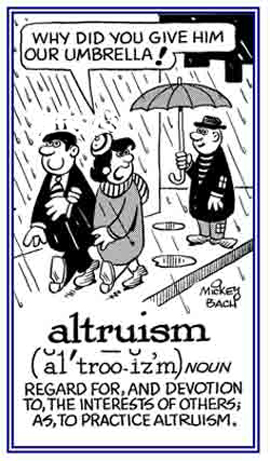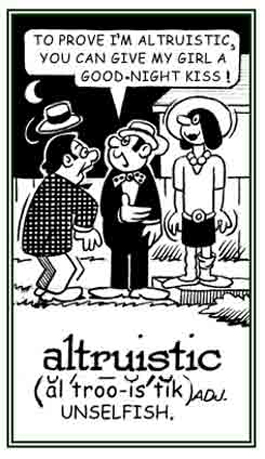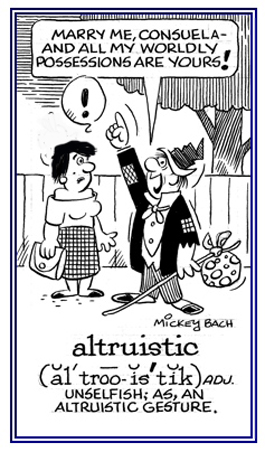alter-
(Latin: different, other, another; to change, to modify)
1. An individual who takes the place of another person; a backup: Hank attended the political convention not as a full delegate but as an alternate.
2. Someone who temporarily fulfills certain jobs and functions: In school when a teacher is sick and cannot teach, there is always an alternate, or a substitute teacher to fill in that day.
3. An understudy for a role: Judy was the alternate in the drama in case the person playing the part got sick and couldn't perform.
2. Someone who temporarily fulfills certain jobs and functions: In school when a teacher is sick and cannot teach, there is always an alternate, or a substitute teacher to fill in that day.
3. An understudy for a role: Judy was the alternate in the drama in case the person playing the part got sick and couldn't perform.
alternate (AWL tur nayt) (verb), alternates; alternated; alternating
To occur by taking turns; to succeed each other, to take turns, to rotate, to interchange, to vary, to change: Mack and his sister alternate washing the supper dishes.
James alternated with Sam in taking the night shift on different nights.
alternately (adverb) (not comparable)
1. Relating to something that happens or follows in turns; succeeding each other continuously: The seasons of the year alternately come one after the other.
2. Serving or used in place of another; a substitute.
3. In botany: arranged singly at each node, as leaves or buds on different sides of a stem; arranged regularly between other parts, as stamens between petals.
2. Serving or used in place of another; a substitute.
3. In botany: arranged singly at each node, as leaves or buds on different sides of a stem; arranged regularly between other parts, as stamens between petals.
alternating (adjective) (not comparable)
1. A reference to something that occurs in a successive manner: There is always an alternating day with night.
2. Pertaining to proceeding by turns: The students were alternating working their assignments at the computers.
3. Characteristic of having emotions passing back and forth from one condition to another: Some people have alternating reactions to happiness and depression.
4. In electricity, relating to the reverses of directions at regular intervals in a circuit.
2. Pertaining to proceeding by turns: The students were alternating working their assignments at the computers.
3. Characteristic of having emotions passing back and forth from one condition to another: Some people have alternating reactions to happiness and depression.
4. In electricity, relating to the reverses of directions at regular intervals in a circuit.
1. A successive change from one thing or state to another and back again.
2. Repeated rotations: People expect to experience alternations of the seasons.
3. In linguistics, a variation in the form of a language as it occurs in different environments or under different conditions.
2. Repeated rotations: People expect to experience alternations of the seasons.
3. In linguistics, a variation in the form of a language as it occurs in different environments or under different conditions.
alternative (adjective) (not comparable)
1. Existing outside traditional or established institutions or systems: The new family lived an alternative lifestyle that the neighbors thought was strange.
2. Suggesting or reflecting values that are different from those of a social establishment or mainstream: There was an alternativenewspaper that reported all kinds of misbehavior by public officials, movie and other entertainment personalities, and even some religious leaders.
2. Suggesting or reflecting values that are different from those of a social establishment or mainstream: There was an alternativenewspaper that reported all kinds of misbehavior by public officials, movie and other entertainment personalities, and even some religious leaders.
The allowance or necessity of a choice between two or more things; considering another possibility: Jane's parents were unable to pay for her college fees; so, she had no alternative but to find a part-time job.

© ALL rights are reserved.
Go to this Word A Day Revisited Index
If Mark wants to get to Los Angeles by tonight, he has no alternative but to go by plane.

Go to this Word A Day Revisited Index
so you can see more of Mickey Bach's cartoons.
A fuel other than gasoline for powering motor vehicles: Examples of alternative fuels include natural gas, methanol, or electricity.
alternatively (adverb) (not comparable)
Relating to how a replacement of something is feasible, or as another possibility: James was trying to alternatively buy a better house.
The salesman told his customer that she could alternatively telephone him if she needed any additional information.
alternis diebus, alt. dieb. (Latin phrase)
Every other day, on alternate days.
Medical directions on a prescription.
1. An attitude or way of behaving marked by unselfish concern for the welfare of others: After the earthquake, there were many who, out of a sense of altruism, volunteered to help the victims.
2. The belief that acting for the benefit of others is right and good: Pearl's cousin had a sense of altruism that motivated her to travel to developing countries to work as a teacher.
3. Etymology: from Latin alteri, a form of alter, "other, another".

© ALL rights are reserved.
Go to this Word A Day Revisited Index
2. The belief that acting for the benefit of others is right and good: Pearl's cousin had a sense of altruism that motivated her to travel to developing countries to work as a teacher.
3. Etymology: from Latin alteri, a form of alter, "other, another".

Go to this Word A Day Revisited Index
so you can see more of Mickey Bach's cartoons.
1. A person who believes in and who practices an unselfish concern for the welfare of others: The charitable acts by the altruists were motivated purely by a real concern for those who needed help during the flooding.
2. Etymology: from Latin alteri, a form of alter, "other, another".

© ALL rights are reserved.
Go to this Word A Day Revisited Index
2. Etymology: from Latin alteri, a form of alter, "other, another".

Go to this Word A Day Revisited Index
so you can see more of Mickey Bach's cartoons.
altruistic (adjective), more altruistic, most altruistic
1. Pertaining to a behavior that shows a desire to aid or to assist other people: The mayor's altruistic concerns for helping the poor resulted in the feeding of many people who were in dire need of assistance in his city.
2. Etymology: from Latin alteri, a form of alter, "other, another".

© ALL rights are reserved.

© ALL rights are reserved.
Go to this Word A Day Revisited Index
2. Etymology: from Latin alteri, a form of alter, "other, another".


Go to this Word A Day Revisited Index
so you can see more of Mickey Bach's cartoons.
Audi alteram partem (Latin phrase)
Listen to the other side.
Also, "There are two sides to every question", which is a plea for reason and fairness in discussions.
Fac alteri ut tibi vis. (Latin phrase)
Translation: "Do unto others as you would have them do unto you."
Considered the "Golden Rule" given by Jesus Christ.


